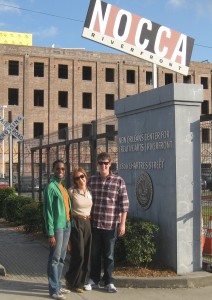
Demystifying Shakespeare is one of the ways Kathleen Mulligan, assistant professor of theater arts at Ithaca College, helps theater students at the New Orleans Center for Creative Arts improve their acting. During Thanksgiving break, Mulligan worked at NOCCA leading workshops in voice and Shakespeare. This was her third consecutive year as a guest instructor at the school. This year, two Ithaca College alumni who graduated from NOCCA, Patrick Hunter ’10, and Jeremy Reese ’09, helped her teach.
Staff Writer Gena Mangiaratti spoke to Mulligan about working in New Orleans, taking the intimidation factor out of Shakespeare and what a “gibberish circle” is.
Gena Mangiaratti: Can you tell me about the workshops you lead?
Kathleen Mulligan: The first year I did my workshop, “Improvising Shakespeare’s Language,” for them, which is some games with language to hopefully get students and actors less intimidated about approaching Shakespeare. Then last year I taught voice workshops. That’s mostly what I did this year. I taught a workshop on the heroics vocal technique. I also did some theater games with the after-school program.
GM: How do you try to make Shakespeare less intimidating for actors?
KM: The workshops that I have done at NOCCA are based on work by two improvisers — Rebecca Stockley and Brian Lohmann. … It’s language improvisation, and what you’re doing is using a lot of the devices Shakespeare used — simile and metaphor plus some of the actual word choices but just playing around with it and improvising in iambic pentameter so the participants are learning the devices of Shakespeare and learning how to make it up themselves. It’s very goofy. The point is, I say to them, “We’re faking it, so you can’t be wrong.” [It] shows actors hopefully that Shakespeare is just English, and that it doesn’t have to be this big, mysterious, complicated thing. You can have fun with it, and it helps actors take ownership of the language in Shakespeare’s plays.
GM: How do you think having two Ithaca College alumni working with you benefited the program?
KM: They came and assisted me with all of my workshops. They gave great feedback to the students on their audition materials, and they also gave great feedback to the seniors while I was teaching the younger students and talked about auditioning for colleges and that whole process. It was very helpful for the students to have someone who was more their age talking about the school and about auditioning for colleges.
GM: Were there any particularly memorable moments at NOCCA this year?
KM: I had been working with the more advanced students doing some work on the heroic vocal technique, and it was really hard work. I was asking them to do work that is pretty advanced, and they were really sticking with me, but some were really frustrated because they weren’t getting it. Then I just started doing some Shakespeare improv exercises with them, and we were doing this exercise called a “gibberish circle” where they’re making up words and then giving them Shakespearean definitions. They were laughing and clapping and supporting each other. They were having so much fun and all the tension or intense focus of the work I was doing before, they were able to let it go. They were very successful and really doing some sophisticated work.
GM: Have there been any changes in your experience since your first visit to NOCCA?
KM: The level of the students. I noticed a difference this year at NOCCA. The bar is set a little higher, so I was able to do more advanced work with them. I’m really impressed with them. The first time I went was just after Katrina, and the school had survived, but they were still kind of in recovery. The school is really thriving now. They’re in one of the cultural gems of the United States, and they get amazing writers and musicians and actors to come because a lot of people either are in New Orleans or come through New Orleans.
GM: What do you look forward to each year?
KM: I just love the energy of that city. I have
really fallen in love with NOCCA, this year especially. It’s great to meet these kids that may not have this opportunity if the state wasn’t providing it. It’s a really exciting place for young artists, and it’s nice to see something like that, that any kid can go to. It’s a great place for young artists, and I told the students when I was working with them, … “I’m going to see your audition pieces, and I’m going to offer some criticism, but please keep in mind that it’s because I want to help you make a better audition because I would like to have more NOCCA students coming to Ithaca.” So I just hope I can continue going down again and again.




